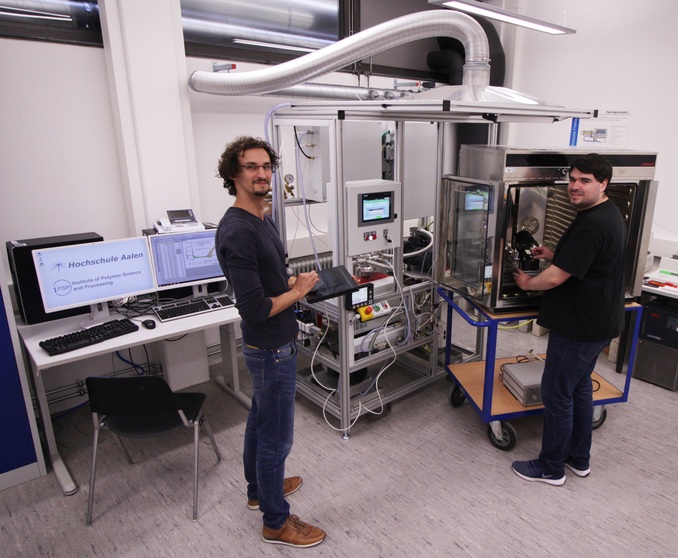New Measuring Device Detects the Smallest LeakagesResearchers at Aalen University are investigating the adhesion of plastics to metals.

Marcel Spadaro (l) and Dennis Jahn from Aalen University track the smallest leakages with the new helium leakage measuring device. Photo: © Aalen University | Shalem Indrupati
Long-lasting products are sustainable. This applies to smartphones in the same way as to engine control units or battery cells for electric mobility. For that reason, electric and electronic components must be protected from intruding moisture, so that they endure for the complete service life. Only when plastics tightly seal, e.g. the metal electrodes of a pacemaker, thee sensitive inner electronics are protected from potential damages caused by penetrating bodily fluids. A new measuring device allows researchers at Aalen University to detect the smallest leakages in the interface of adhesively bonded plastic-metal joints and thus help to improve the seal tightness of such interfaces.
With the help of a newly designed and highly sensitive system the researchers of the Institute of Polymer Science and Processing (iPSP) at Aalen University are investigating the gas and liquid tightness of joints between an electrically conductive metal and a insulating plastic.
The seal tightness is particularly important where two different materials meet and have to be tightly connected, such as in a battery cell at the interface between the metallic pole and the surrounding electrical insulation. “It’s crucial for both the function and service life that the interface, the surface area where both materials are brought together, is as tightly sealed as possible”, says iPSP director Prof. Dr. Achim Frick.
To date, it’s not yet fully understood how an injection-molded plastic adheres to a metal surface, and which factors are mainly influencing the adhesion. With the newly developed measuring device at Aalen University, the researchers can now precisely analyze an injection-molded adhesive joint between metal and plastic, by measuring the gas tightness with high accuracy.
“The key to a greener future with sustainable technology lies in the development of long-lasting products, and essentially depends on the tightness of the adhesive joints between metals and plastics, for example in data and power transmission”, explains Prof. Frick. “A smartphone’s USB-port needs to be protected from the high humidity inside a bathroom; no oxygen may enter a battery cell through the connectors, nor should electrolyte leak. A leak between the electrically conductive metal and the insulating plastic leads to an undesired malfunction and severe issues in both cases”.
Already few atoms indicate leakage
Prof. Frick’s team is currently developing a procedure to measure and characterize the joint tightness of injection-molded metal-plastic components. Their goal is to find optimal metal-plastic combinations and appropriate injection-molding conditions for the production of durable and tightly sealed joints, that best prevent mass transfer along the interface. In future, their development should prevent e.g. corrosion or short circuits.
Large leaks can already be spotted by the naked eye, e.g. if fluid is spilling. Small leaks can be detected by a pressure drop over a certain period of time, for instance in a damaged bicycle tube. Detecting and measuring the smallest leaks requires a leakage measurement with a test gas like helium. The diameter of a helium atom is around 100,000 times smaller than a human hair. That’s why helium can pass through the smallest gaps and even penetrate through materials. The helium leakage measuring device used by Prof. Frick and his team detects even a small number of helium atoms that come through possible microscopic gaps in a leaky bond. The number of helium atoms is measured using a mass spectrometer. With this method, it is possible to detect the smallest leakage paths in materials or interfaces between two different materials.
The new measuring device was designed, developed and built in collaboration with company Dr. Wiesner Steuerungstechnik GmbH in Remshalden (Germany), a project partner in the research project “InDiQuant” funded by the German Federal Ministry for Economic Affairs and Energy. The leakage analyzer is used at Aalen University to research the adhesion and tightness of injection-molded metal-plastic joints.
